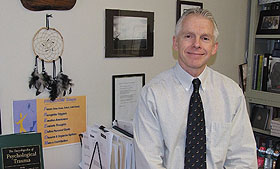Feature Story
As published in the UConn Advance, December 8, 2008.
Psychiatry Professor an Expert on Post-traumatic Stress Disorder
By Carolyn Pennington

Julian Ford, associate professor of psychiatry, in his office at the Health Center.
Photo by Carolyn Pennington
Julian Ford has been highly prolific over the past year. The associate professor of psychiatry has four new books bearing his name – all of them dealing with posttraumatic stress disorder in adults or children.
PTSD affects more people than you may think, says Ford. It’s not just the soldiers coming home from Iraq and Afghanistan or those who experience horrific tragedies like 9/11. Children who grow up in dangerous or impoverished environments can experience chronic trauma, such as prolonged abuse or family violence.
“These children have to be little soldiers,” he says. “Even when parents and the community do the best they can, they still live in what amounts to war zones.”
Survival mode
Ford’s co-edited book Treating Traumatized Children: Risk,
Resilience and Recovery (Routledge) looks at children
internationally and how they’ve adapted to trauma. “Sometimes they
can flourish and prosper in spite of traumatic circumstances,” he
says. “In those cases, you don’t want to interfere, but support them
in their positive ways of coping.”
Why do some people handle traumatic events better than others? In his book Posttraumatic Stress Disorder: Science and Practice (Elsevier), Ford cites socioeconomic resources, community and societal support, and also genetics. Some people are more prone to anxiety and distress. But no matter how smart, wealthy, or strong you are, anyone can be thrown into a biological survival state if the situation is horrific enough.
“Your body automatically shifts into a self-protective survival mode,” says Ford.
The first stage is a freeze reaction, you’re assessing the danger and scoping out your options. The second stage is flight. If you can’t flee, then you fight, which is the third stage. If the danger persists, your body goes to the fourth stage which is actually a kind of paralysis, your body basically shuts down.
An example is a prolonged sexual assault, when the victim stops fighting back even though his or her brain wants to continue fighting.
The body is doing this for two reasons – conserving biological resources so the victim doesn’t die, and potentially fooling the predator into thinking they’ve subdued their opponent and move on.
Understanding trauma
Someone who experiences only the earlier stages of trauma will be
less likely to have a long-term disorder, Ford says. The more
serious problems are related to more prolonged and severe stressors.
Other factors, such as socioeconomic, intelligence, and anxiety
proneness, may also play a role but they are secondary to how much,
how badly, and how long the victim was exposed to the trauma.
In order to better treat PTSD, you need to understand it. Ford says his co-edited book The Encyclopedia of Psychological Trauma (Wiley) has “everything you wanted to know about psychological trauma but were afraid to ask.”
The book is geared to health care professionals and educators, but is written in a way that students and lay persons can understand and may find useful if they suspect someone they know is suffering from PTSD.
Some people will experience delayed PTSD, notes Ford. This often happens in life transitions, when the person experiences another small or large stressful situation that disrupts relationships or throws a person’s emotions out of balance.
Treatment helps the person to “understand that this is an aftershock and not the earthquake all over again,” says Ford.
Managing emotions
Ford says the key to recovery from PTSD is not “getting over” the
memories, but understanding how they affect you now and what you can
do to manage your emotions, when new stressors turn on your brain’s
survival alarm.
“That’s exactly what we teach in the therapy I’ve developed in my work at UConn,” he says, “which is called ‘Trauma Affect Regulation: Guide for Education and Therapy’ and is copyrighted by UConn.”
Ford deals with the most severe cases in his co-edited book Treating Complex Traumatic Stress Disorders: An Evidence-Based Guide, which includes people who experienced psychological trauma as a child – family abuse, neglect, years of violence, or separation from parents due to substance abuse, incarceration, or hospitalization.
In those instances, kids grow up learning how to make adaptations they don’t even realize. Adaptations include being depressed, angry, abusing drugs and alcohol, or engaging in risky behaviors such as cutting oneself.
“To treat those conditions,” Ford says, “you need to help people manage their bodies and emotions, as well as helping them to deal with anxiety.”
In the therapy approach Ford developed, the therapist teaches emotion regulation skills such as the “SOS,” which stands for slow down, orient, and self-check.
“It’s like providing them with a mirror so they can see how their body reacts,” he says.
“Trauma forces us to focus externally, but life needs both looking out and looking in. It may take a while, but therapy restores that balance. It’s something that is possible, even after the worst kinds of trauma.”


